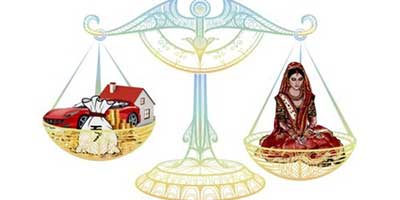Relevance: GS-2: Welfare Schemes for Vulnerable Sections of the population by the Centre and States and the Performance of these Schemes
Key Phrases: Dowry Prohibition Act 1961, International covenant on civil and political rights
Why in news?
- Department of Women Welfare in Uttar Pradesh has sought affidavits from public servants declaring that they have received no dowry when they got married.
Analysis:
What is dowry?
- Term dowry has not been defined in IPC but in Dowry Prohibition Act, 1961. According to the act, it has been defined as any property or valuable security given or agreed to be given directly or indirectly: By one party to a marriage to the other party to a marriage
- Customary payments as are prevalent in different societies, such as at the time of birth of child etc., are not covered within dowry.
- Giving & taking dowry both are offences.
Causes of dowry tradition
- Customs and traditions : A majority of dowry-related cases in India take place to adhere to the customs and traditions of the Indian society.
- Social structure : The Indian society is mainly patriarchal and the dowry system is largely the manifestation of the patriarchal nature of the Indian society where women are being considered as a burden on the family and giving dowry is one kind of compensation for transferring its burden
- Fear of ill-treatment : Many families in India give dowry to get rid of their insecurity of ill-treatment of their daughters by their in-laws
- Societal pressure :Many a time, it becomes a matter of status to give dowry. In Indian society, it has become a common phenomenon to measure one’s status by the amount of money one spends on their daughter’s marriage
- Social constraints: Compulsion to marry within one’s caste or clan further intensifies the problem. These limitations deplete the pool of desirable grooms leading to a lack of desirable options thus helping the desirable side to demand more
Effects of dowry on society
- Gender discrimination: As the trend goes, dowry is one of the heavier financial burdens to be borne by the bride’s family, this invites discrimination against girls right from their birth.
- As per the State of World Population 2020 report by the United Nations Population Fund (UNFPA), India accounts for 45.8 million of the world’s 142.6 million “missing females” over the past 50 years (Missing females are women missing from the population at given dates due to the cumulative effect of postnatal and prenatal sex selection in the pas
- Violence against women: It has been the case that despite the payment of dowry by the bride’s parents, the groom’s families keep on demanding more eventually leading to violence against women. According to the National Crime Records Bureau (NCRB) 2019 data for IPC cases, a woman becomes a victim of dowry death roughly every one hour.
- Dowry deaths accounted for 40% to 50% homicides in the country for almost a decade from 1999 to 2018.
- India’s sex ratio at birth and its child sex ratio has languished at much lower than ideal levels, in large part due to a preference for male children in many parts of the country. Haryana had a gender ratio of 833 females in 2016
- Declined social status and self-esteem of women : Since women face such discrimination from early childhood, they have low self-esteem compared to men of their age. They are made to believe that they are a burden on their families and thus undesirable
Laws against dowry
- The Dowry Prohibition Act, 1961.Under this Act, dowry is illegal in India. The Act also makes any act to take or give dowry punishable in India
- The Indian Penal Code (IPC) sections. Section 304B deals with dowry death in India. It states that if a woman dies within seven years of marriage by any burns or bodily injury or causes other than natural then death will be considered as dowry death
Why have laws failed to prevent dowry tradition?
- Law talks about punishing both who give and receive dowry and this fear prevents most of the reporting from girl’s side
- Allows gifts that are of a "customary nature". The definition of a "voluntary gift" and a "forceful gift" is missing. Perpetrators invoke this exception
- Seven-year period limitation for dowry deaths works for perpetrators as they commit crime after the period ends
Way ahead
- Cruelty to women by the husband or relative of the husband which is punishable with up to three years of imprisonment. It includes mental and physical harm. The prescribed punishment for such a wilful act must be increased. Such torture is violative of Article 12 of the International Covenant on economic, social, and cultural rights
- Presumption period of "within seven years of marriage" must be increased. Dowry death is violative of Article 4.2 of the International Covenant on Civil and political rights
- Eliminating gender-based violence is imperative as it violates the Convention on Elimination of all Forms of Discrimination(CEDAW) which is a constitutional obligation
- Women should be encouraged to become self-dependent and efforts should be made to make education accessible to every girl child.
- Efforts to spread awareness should be made against dowry and dowry-related violence and women should be made aware of their rights. Awareness campaigns should be organised at school and local levels.
Source: Live Law









